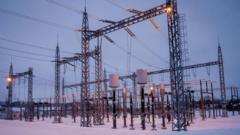In a monumental shift towards energy security and independence, the Baltic states have successfully disconnected from Russia's electricity grid, marking a significant milestone in their integration with the European Union.
Baltic States Sever Ties with Russian Power Grid, Integrate into EU Network

Baltic States Sever Ties with Russian Power Grid, Integrate into EU Network
The Baltic nations of Estonia, Latvia, and Lithuania achieve energy independence from Russia, embracing the European Union grid.
The historic move, finalized just over two days, underscores the urgency dictated by geopolitical developments and reflects the region's commitment to resilience in the face of external threats.
The Baltic states of Estonia, Latvia, and Lithuania are celebrating a pivotal transition as they officially disconnect from Russia's electricity grid, integrating themselves into the European Union's energy network. This significant change, which has been under discussion since 2007, was expedited following Russia's aggressive actions in Ukraine beginning in 2022.
European Commission President Ursula von der Leyen declared, "Today, history is made... This is freedom, freedom from threats, freedom from blackmail," during a ceremony held in Lithuania's capital. Polish President Andrzej Duda praised the moment as a crucial step towards bolstering security in the region, emphasizing its importance for resilience against potential aggressors.
Previously linked to the Brell power grid, controlled by Moscow and encompassing Belarus, Russia, and the Baltic states, the trio's energy reliance has been a longstanding concern. Although the Baltic nations had halted electricity purchases from Russia since 2022, their connection to the Brell grid left them vulnerable.
Von der Leyen cautioned that NATO must remain vigilant against possible retaliation from Russia, highlighting spurious attacks on undersea cables and pipelines in the region. Indeed, recent months have seen over a dozen instances of damage to critical infrastructure, raising alarms among Baltic leaders.
Lithuania's President Gitanas Nauseda urged for sanctions against what he termed Russia’s "shadow fleet" following reports linking Russian ships to damage inflicted on Estonia's primary power cables. While NATO refrained from directly implicating Russia, it launched a new patrol mission, dubbed Baltic Sentry, to enhance security in the region.
The transition to the EU grid, an investment totaling approximately 1.6 billion euros largely funded by the EU, involved a brief period where the three nations operated as an “energy island.” The final connection took place in a different timeline where Baltic unity in the face of aggressive external pressure becomes a new paradigm for European energy strategy, emblematic of their resolve for sovereignty and stability. Ukrainian Energy Minister German Galushchenko characterized the achievement as a "significant event for the whole of Europe," symbolizing a collective step toward energy independence.
The Baltic states of Estonia, Latvia, and Lithuania are celebrating a pivotal transition as they officially disconnect from Russia's electricity grid, integrating themselves into the European Union's energy network. This significant change, which has been under discussion since 2007, was expedited following Russia's aggressive actions in Ukraine beginning in 2022.
European Commission President Ursula von der Leyen declared, "Today, history is made... This is freedom, freedom from threats, freedom from blackmail," during a ceremony held in Lithuania's capital. Polish President Andrzej Duda praised the moment as a crucial step towards bolstering security in the region, emphasizing its importance for resilience against potential aggressors.
Previously linked to the Brell power grid, controlled by Moscow and encompassing Belarus, Russia, and the Baltic states, the trio's energy reliance has been a longstanding concern. Although the Baltic nations had halted electricity purchases from Russia since 2022, their connection to the Brell grid left them vulnerable.
Von der Leyen cautioned that NATO must remain vigilant against possible retaliation from Russia, highlighting spurious attacks on undersea cables and pipelines in the region. Indeed, recent months have seen over a dozen instances of damage to critical infrastructure, raising alarms among Baltic leaders.
Lithuania's President Gitanas Nauseda urged for sanctions against what he termed Russia’s "shadow fleet" following reports linking Russian ships to damage inflicted on Estonia's primary power cables. While NATO refrained from directly implicating Russia, it launched a new patrol mission, dubbed Baltic Sentry, to enhance security in the region.
The transition to the EU grid, an investment totaling approximately 1.6 billion euros largely funded by the EU, involved a brief period where the three nations operated as an “energy island.” The final connection took place in a different timeline where Baltic unity in the face of aggressive external pressure becomes a new paradigm for European energy strategy, emblematic of their resolve for sovereignty and stability. Ukrainian Energy Minister German Galushchenko characterized the achievement as a "significant event for the whole of Europe," symbolizing a collective step toward energy independence.




















